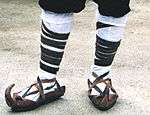Ciocia
Ciocia (pronounced [ˈtʃɔːʃa] in Rome and Northern Lazio;[lower-alpha 1] plural ciocie) is an ancient and ethnic footwear of Latium (Lazio), Abruzzo, Molise, located in central Italy. Similar footwear can be found in Basilicata, Campania, Calabria, as well as the Balkans as the opanci.

Origins and history
The name probably comes from late Latin soccus, meaning slipper. It has many other forms in some Italian dialects like chioca, chiochiera, ciòcero or sciòscio in Neapolitan language. The terms ciociari and Ciociaria have a lexical similarity to the noun ciocia, so many historians thought they have their root word in local footwear's name, so ciociari would mean 'people who wear ciocie'.[1]
Italian peasants and shepherds used to wear ciocie especially in Lazio, Molise (province of Isernia) and Abruzzo, and they were represented since the 18th century in paintings, in poetry and in storiographic works for their typical shoes and for their coloured clothes. In Basilicata, Campania, Calabria, Gargano, Etna, Kosovo and North Macedonia similar footwears are reported as well.
In the traditional form, ciocie were made of large soles in leather and straps (strenghe or curiole) with which the leg was tied from the ankle to the knee. Before donning the ciocie, the feet, ankles, and calves were covered by a large napkin (pezza, plural pezze), instead of socks.
See also
Notes
- Also chioca [ˈkjɔːka] in Abruzzo and Marche, chiochiera [ˈkjɔːkjərə] in Abruzzo, ciòcero [ˈtʃɔːʃərə] in Minturno area, zampitto [dzamˈpittə] in Southern Latium, Colli Albani and Mezzogiorno, sciòscio [ˈʃɔʃʃə] in Campania.
References
- (in French) Dubarry A., Le brigandage en Italie depuis les temps les plus reculés jusqu'à nos jours, Plon & Cie, Paris 1875, pp. 269-286.
External links
- (in Italian) La ciocia.it
- (in Italian) La terra delle ciocie